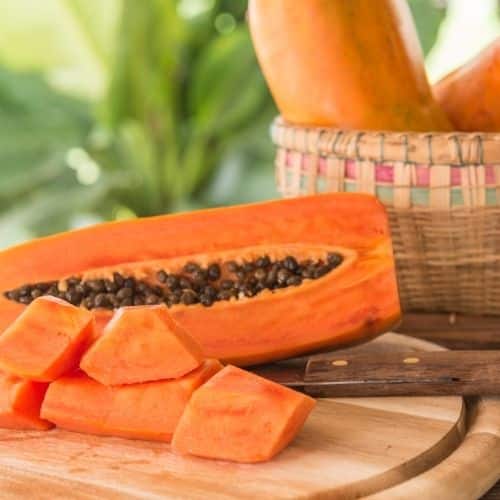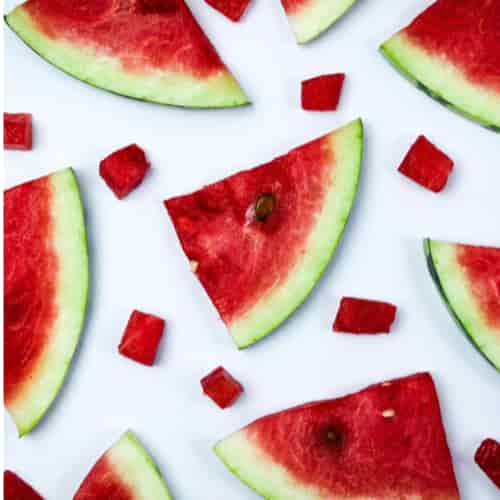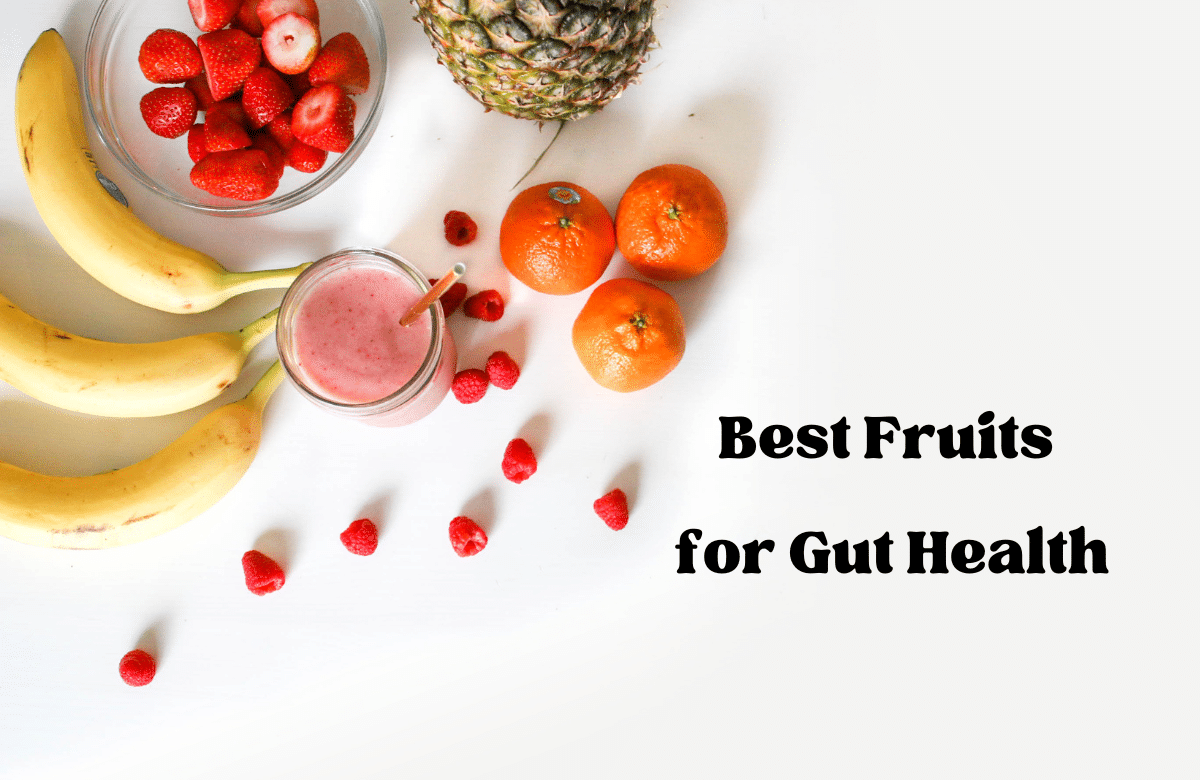11 Best Fruits for Gut Health
It’s no secret that eating fruit has a wide variety of benefits for overall health.
Table of Contents
ToggleWhen it comes to gut health, certain fruits have unique properties. These properties promote digestive wellness.
Here are the best fruits for gut health that you should consider adding to your diet. From bananas to pears, these top choices will help support your digestive system and keep it functioning optimally.
Banana
With its high fiber content and natural sugars, banana is gentle on the digestive system. What’s more, fiber promotes regular bowel movements and aids digestion.

Bananas also have inulin, a starchy substance that helps increase the good bacteria in the gut—specifically bifidobacteria and lactobacilli.
Pro tip: green bananas have larger amounts of resistant starch, providing more benefits for your gut.
Blueberries

Blueberries are bursting with flavor. They’re not only delicious but also offer remarkable benefits for gut health.
The fiber content aids in regulating bowel movements. Furthermore, blueberries contain natural compounds, such as polyphenols. These compounds can reduce inflammation in the gut, protecting against certain gastrointestinal disorders.
Including blueberries in your diet will contribute to a thriving gut ecosystem, ensuring optimal digestion and improved overall well-being.
Kiwi

This small fruit is rich in dietary fiber, making it an ideal choice for assisting digestive function.
The fiber content in kiwis helps regulate bowel movements, promoting a healthy digestive system and preventing constipation.
Additionally, kiwi is abundant in natural enzymes, such as actinidin, which facilitates digestion. These enzymes help alleviate common digestive issues, like bloating and discomfort after meals.
Moreover, kiwi is a great source of vitamin C and antioxidants. Both are known to reduce inflammation in the gut.
Papaya

Papaya is well known in many countries for its digestive benefits.
The high amount of dietary fiber in papaya helps regulate bowel movements for a healthy digestive system. Additionally, the high water content of papaya helps hydrate and soften the stool, preventing constipation.
Loaded with antioxidants like vitamin C and beta-carotene, papaya also helps reduce inflammation in the gut.
In Mexico, papaya is often served at breakfast by itself or included in a smoothie.
Apples

Packed with both soluble and insoluble fiber, apples help regulate bowel movements and promote healthy digestion.
Soluble fiber has a beneficial effect on the function of the intestines. It does this by absorbing water and creating a gel-like substance in the stomach. This slows digestion, enabling more nutrients to be absorbed from food as it passes through the digestive system.
Additionally, soluble fiber helps reduce inflammation in the gut, protecting against certain gastrointestinal disorders.
Insoluble fiber helps improve problems with constipation by adding bulk to stools and promoting regular bowel movements.
Apples also contain a type of fiber called pectin, which acts as a prebiotic, nourishing beneficial gut bacteria.
Pineapple

This tropical fruit contains bromelain, an enzyme that aids in digestion and reduces inflammation in the gut.
Bromelain helps break down proteins, making them easier to digest. This may help reduce symptoms of gastrointestinal problems, like indigestion and bloating.
The high fiber content in pineapple also helps regulate bowel movements, reducing the risk of constipation.
Pineapple is widely available and can be enjoyed fresh or as juice for a tasty snack.
Watermelon

Due to its high water content and fiber, watermelon helps maintain hydration and promotes healthy digestion.
It also contains beneficial compounds like lycopene, which has been linked to improved gut health.
Mango
Mango is an incredibly nutritious and delicious fruit that can help to promote gut health. Rich in fiber, vitamins, and minerals, mango helps regulate bowel movements and reduce constipation.

The fiber content also helps nourish the beneficial bacteria in the gut, fostering a thriving gut microbiome.
Additionally, mango contains enzymes like amylase and protease, which assist in breaking down carbohydrates and proteins, facilitating efficient digestion.
This fruit is also rich in vitamins A and C, powerful antioxidants that help reduce inflammation in the gut.
So, you can indulge in the tropical goodness of mango while nourishing your gut at the same time.
Pears
Delicious and juicy pears have more to offer than just their sweet taste. In fact, they provide significant benefits for maintaining a healthy gut.

Pears are packed with fiber, both soluble and insoluble, which play crucial roles in supporting digestion.
The soluble fiber forms a gel-like substance in the digestive system and helps regulate bowel movements and prevent constipation.
On the other hand, the insoluble fiber adds bulk to the stool, promoting regularity and preventing digestive issues.
Like apples, pears contain pectin, a type of fiber. This fiber acts as a prebiotic and provides nourishment to beneficial bacteria in the gut. By supporting a balanced gut microbiome, pears help enhance overall digestive health.
Pears are also rich in antioxidants and flavonoids. These compounds have anti-inflammatory properties that may help protect the gut lining from damage.
Cherries

Cherries can do wonders for your gut health. These colorful little fruit are packed with the fiber that is essential for a healthy digestive system.
Fiber helps to keep things moving smoothly through your intestines, preventing constipation and promoting regular bowel movements.
In addition, cherries contain natural compounds called polyphenols, which have been shown to have anti-inflammatory properties. This means that cherries can help reduce inflammation in the gut, making it easier to digest and absorb food.
Grapes

Grapes, those small and juicy delights, offer a variety of benefits for your gut health. One of the key advantages of grapes is their high fiber content.
As we have already seen, fiber plays a crucial role in maintaining a healthy digestive system by promoting regular bowel movements and preventing constipation.
Furthermore, grapes are a natural source of resveratrol, a compound known for its potential benefits in protecting the gut lining.
Whether you enjoy red, green, or purple grapes, incorporating them into your diet can contribute to a healthy gut.
The Bottom Line
To sum it up, certain fruits are particularly beneficial for your gut health. Fruits like blueberries, kiwis, papayas, mangoes, pears, cherries, and grapes provide important elements that support a healthy digestive system.
They are rich in fiber, which helps keep your digestion on track and prevents constipation.
They also contain antioxidants that reduce inflammation in your gut, making digestion easier and more comfortable.
Additionally, they have natural enzymes and other compounds that aid in breaking down food and maintaining a balanced gut environment.
By adding these fruitsin to your diet, you can give your gut the care it needs to function at its best. So, enjoy these delicious flavors and colors while knowing they are helping your gut stay happy and healthy.
This post was written by dietetic intern Natalie Larsen. Edited by Dr. Su-Nui Escobar, DCN, RDN, FAND.

Dr. Su-Nui Escobar, a Registered Dietitian/Nutritionist in Miami, FL, is dedicated to empowering women in perimenopause and menopause to live healthier, more satisfying lives.
With a doctorate in clinical nutrition from the University of North Florida, she has expertise in menopause and weight loss, including the unique challenges faced by those on weight loss medications.
Su-Nui’s passion for her field is evident in her previous role as the Academy of Nutrition and Dietetics spokesperson.


